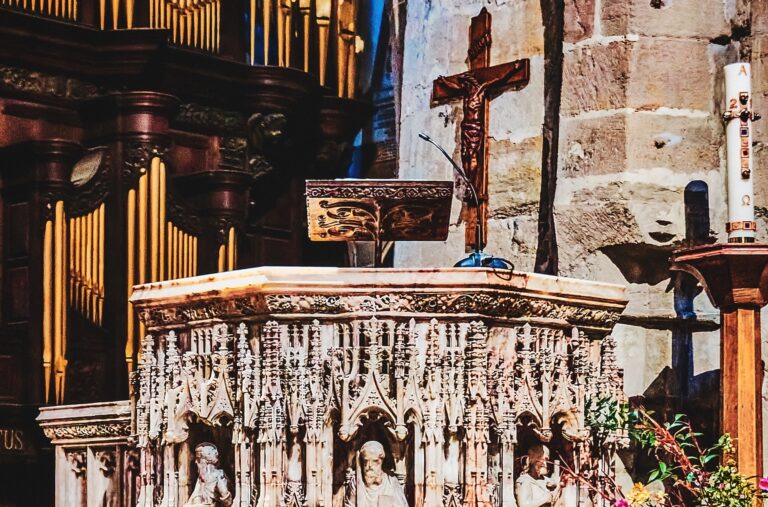
Fr. Robert McTeigue, SJ, is a member of the US Eastern Province of the Society of Jesus. A professor of philosophy and theology, he has taught worldwide and is known for his classes in both rhetoric and medical ethics. He is a member of the National Ethics Committee of the Catholic Medical Association. His book on preaching, I Have Someone to Tell You: A Jesuit Heralds the Gospel is now available at Amazon in both paperback and electronic form. His latest books from Ignatius Press are Real Philosophy for Real People: Tools for Truthful Living (2020) and Christendom Lost and Found: Meditations for a Post-Post-Christian Era (2022). He is the host and producer of “The Catholic Current” via The Station of the Cross Catholic Media Network.
Recently, clerics of various degrees of notoriety and rank have been making public statements in a variety of forums about the nature of love and the teaching of the Church. These statements have led to confusion and scandal among the faithful. Consequently, I chose in a recent sermon to address these issues in light of the readings of the day. Afterward, people urged me to make public the text of my sermon, which had been recorded at the time but not written in advance. I did my best to make a record of what was audible to the ear legible to the eye.
Let’s start with the Gospel of Matthew, 10:26-32. There we can learn something about general judgment. We’re all mindful (or should be) of our own particular judgment, but there is the general judgment where all will be revealed for the greater glory of God. It must be revealed for all not only that God is merciful, but that God is just and that God’s judgments are right and true.
Consequently, all the secrets of the world will become known to every soul. That means that all of the times when we turned a blind eye, every time we pretended that we didn’t know, every time we knew that we should have spoken up but told ourselves, “it was somebody else’s job”—all that will be revealed.
Depending upon your point of view, the doctrine of the general judgment can be alarming or consoling. Right now, I find it consoling, for the untold suffering of Christians these days will finally be told—the massacres in Nigeria, the persecution in China, and the desecrations in Europe and the United States. All of these stories will be told, and the friends and enemies of God from these times will be definitively revealed.
While these persecutions are underway, there are people who offer to rock us asleep. They say soothing words like “love is love,” “all are welcome,” “inclusion, not exclusion,” “dialogue,” “listening,” and “encounter.” They even say a word that used to have a good reputation, “synod.” With these soothing words, they try to reassure us: “Just go back to sleep. It’s all been a bad dream. All that Sacred Scripture you read, all that Sacred Tradition—say ‘bye-bye.’ Shhh.., It’s over now. It’s the New Springtime. And it’s going to be wonderful, comrade. Just you wait…” While these persecutions are underway, there are people who offer to rock us asleep. They say soothing words like “love is love,” “all are welcome,” “inclusion, not exclusion,” “dialogue,” “listening,” and “encounter.”
Let’s turn now to the First Epistle of John, Chapter 3: “Whoever is not just is not of God.” Justice, in the classical sense, means to give each his due. What is due God, above all, is worthy worship. As finite sinners, we have a problem because we can’t do that. We can only offer worthy worship by uniting our poor, imperfect love, our poor, imperfect sacrifice, with the one perfect, loving, obedient sacrifice of Christ on Calvary, made present again at this altar. This is our only hope; there isn’t anything else. We cannot do justice to God without uniting ourselves to Christ in the Holy Sacrifice of the Mass.
Speaking of justice, what do we owe to our neighbor? Some of our fellow Christians might answer with, “Oh, I know this one! Our neighbor is owed other people’s wealth! Let the redistribution begin!” In fact, what we most owe our neighbor is what he needs most: the truth, the whole truth, the saving truth, because Christ the eternal Logos, the spoken Word of the Father, His very being is the fullness of truth. Therefore, withholding the truth from our neighbor is not love.
St. John goes on to say that he who does not love his neighbor is not of God. Well, that shouldn’t be a cause for concern, right? Because after all, love is love. And “if you really, really, really, really feel it, then it must be true!” said no saint ever. Neither the Epistles of St. John nor any other portion of Sacred Scripture ever said that.
We know that love is wanting the best for the beloved, and the best for any human person is God Himself. Every human person we love is made in the image and likeness of God, is rational and free, and is therefore moral. Every person we love was created by God to delight in the true, the good, and the beautiful and find perfection—satisfaction—to be made full, only in the happiness of Heaven.
This means that if you’re not working on someone’s salvation, it isn’t love. Call it what you will. However intensely you may feel it, with whatever part of you may feel it —it doesn’t matter if it’s not helping a person progress in holiness. It is not love. And no dialogue, no encounter, no listening session, not even listening to the “lived experience of people at the peripheries now pulled into the center” can change that.
As Christians, we must insist that real love is only working to help people become saints. To become a saint is to know and love the Christ of God Who is the fullness of truth. We owe our loved ones the truth, beginning with the obvious: we’re rational; we’re bodily either male or female. We deny these very obvious, well-known, long-known truths at our peril.
And that’s just at the level of nature! The stakes are heightened when we consider the order of grace and revelation. On the order of nature, when we tinker with male and female and what real love is in that context, we just destroy civilizations. But on the spiritual level, in light of what the Christ of God offers us, which is the happiness of Heaven, we deny our neighbor, whom we claim to love, access to Heaven if we don’t tell him the truth about what real love is.
Real love is sanctification, or it is not love at all. Real love is sacrificial, and it’s costly, and it’s hard. So the monasteries have tried to tell us for centuries, along with the mystics and the martyrs and the penitents. They all tell us that grace is free, but it is never cheap. Heaven is attained only by entering the narrow gate, following in the bloody footsteps of the crucified God-Man.
I’m sorry to say that there are people in this world, people whom we have every reason to believe should have known better, who are now trying to tell us otherwise. They’re trying to tell us that real love is what we say it is and not what God says it is. Granted, it may be somebody else’s job to offer a correction, even a fraternal one to those people who should have known. But it is our job to say that lies are lies, lies never heal, and lies never liberate. These popular illusions about love are not freeing. God calls us to the heights of holiness by calling us to conform to the truth, and we know, too, that God Almighty does not command the impossible.
St. Ignatius Loyola taught that the grace necessary for salvation is always, in every moment, available to anyone who asks for it. Grace is needed for us to do God’s will, to make our will conform to the divine will, so that we may be at one with Christ. Alas, we live in a time and place such that many people, including people who really should know better, are saying: “Never mind. We don’t need grace and we don’t need revelation and we don’t need Christ. Soon and very soon, we’re going to have a blank slate, and we’re going to do whatever we want. And we’re going to call it godly.”
My Jesuit brothers Edmund Campion, Robert Southwell, and Miguel Pro—knew what they were about. And they knew that whatever happened to them in this life, their final vindication would be in Christ. Because there is no lie in Christ; there cannot be any lie in Christ. Therefore, it is incumbent upon us to refuse to remain silent when other people lie in His name. It’s our job, to tell the truth. It’s our job to hand on faithfully what the bloodstained hands of martyrs and the fervent prayers of the monasteries handed on to us across centuries and oceans.
In our time and place, the priceless treasure of revelation has been entrusted to us. God and Satan are watching to see how and even whether we will hand it on. And make no mistake, all will be revealed, and one who is not just is not of God. Please dear God, through the intercession of St. Polycarp, bishop, and martyr, may we make the right choice when the time comes.
